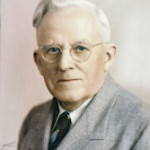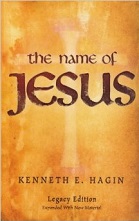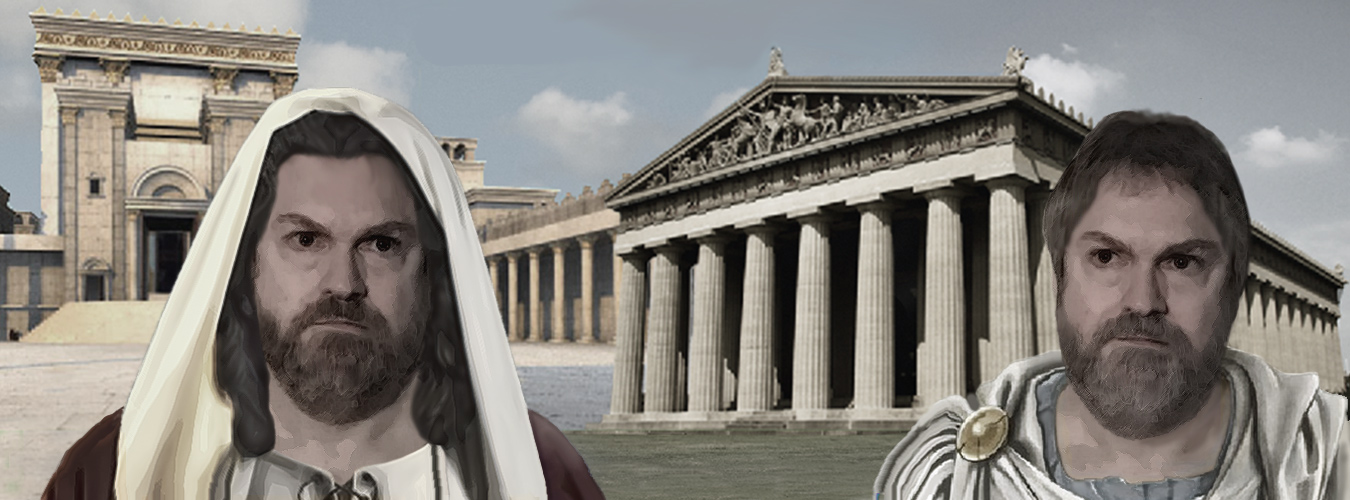
Many WoF critics have made the assertion that the true father of the Word of Faith movement was not Kenneth Hagin, but E. W. Kenyon. Kenyon was a prolific author, radio teacher, and pastor for half a century in New England and Seattle during the first half of the 20th century. In this three-part series I’m going to establish why the critics are wrong, and why Kenneth Hagin was the true leader. I’ll also offer evidence that even if Kenyon had been the true father of the movement, it would have been no indictment of the movement since he didn’t agree with or teach metaphysical theology.
The Word of Faith Movement began in the mid 1970s when Kenneth Hagin founded Rhema Bible Training Center in Broken Arrow, Oklahoma and began hosting Kenneth Hagin Ministries’ annual campmeeting, a week-long convention held in Tulsa, Oklahoma for teaching and preaching the message of faith. Within a few years literally hundreds of churches were established across the country by Rhema graduates or people inspired by Brother Hagin’s teachings. People were teaching the message on the radio and television, and hundreds of books were written on the topic.
All of this came after Brother Hagin had spent over twenty years as an itinerant teacher, first as an Assembly of God minister and then as an interdenominational minister on the radio and in various locations, including hotel ballrooms, Full Gospel Businessmen meetings, and churches of other denominations. Through those years he established name recognition and familiarity with his ministry and his teaching, which enabled him to establish a following and raise the funds necessary to do what he did.
Plagiarism Allegations
Now if you only consider these facts it’s pretty obvious that he was the leader of the Word of Faith movement. However, the critics have cited numerous examples of Brother Hagin either quoting Kenyon or drawing off of Kenyon’s wording, and offered them as proof of the fact that Kenyon was the true father of the movement. In fact, they’ve even made the assertion that Brother Hagin plagiarized Kenyon’s writings.
Before we go any further, I think it would be best to discuss briefly what plagiarism is, and what it isn’t. Plagiarism is different from copyright infringement. There are no laws against plagiarism as there are against copyright infringement. Plagiarism is primarily a violation of standards in the worlds of academia and journalism. It is not a crime per se, although in cases of copyright infringement it could be grounds for litigation. In the church world however, plagiarism is harder to define. Preachers borrow from other preachers all the time, and they never bother to stop in the middle of a sermon to acknowledge the originator of a phrase, thought, or sermon.
In the book about the Word of Faith movement where the claim was made that Kenyon was the true father of the movement and Kenneth Hagin took his theology from him and plagiarized his works, most of the examples are taken from Kenneth Hagin Ministries’ free monthly publication called The Word of Faith, where transcripts of Brother Hagin’s messages were published. Knowing how the ministry operated I knew after reading the allegations what must have happened. The person doing the transcripts and the person serving as editor of The Word of Faith didn’t recognize that Brother Hagin was quoting Kenyon at length (he had an incredible memory and could quote entire paragraphs and even chapters at times), and as a result no acknowledgments were made. Ordinarily this wouldn’t be a big deal since it was a free publication, but sentiments being what they are this provided ammunition for the critics. They were adamant about the charges that he stole Kenyon’s words, and surely he did it intentionally.
 In 1979 however, Brother Hagin published a book entitled “The Name of Jesus” where he went to great lengths to acknowledge Brother Kenyon’s excellent book entitled “The Wonderful Name of Jesus“. This was years before the allegations of plagiarism surfaced. Now I ask you, if Brother Hagin had intended to steal Kenyon’s work in other publications why would he have offered such praise in this book? The fact is Brother Hagin didn’t actually write that many books. Most of his books were taken from transcripts of his seminars, just like The Word of Faith magazine.
In 1979 however, Brother Hagin published a book entitled “The Name of Jesus” where he went to great lengths to acknowledge Brother Kenyon’s excellent book entitled “The Wonderful Name of Jesus“. This was years before the allegations of plagiarism surfaced. Now I ask you, if Brother Hagin had intended to steal Kenyon’s work in other publications why would he have offered such praise in this book? The fact is Brother Hagin didn’t actually write that many books. Most of his books were taken from transcripts of his seminars, just like The Word of Faith magazine.
I told people my opinion on the plagiarism allegations for years, insisting that it was simply due to the nature of how Brother Hagin’s ministry operated. Then recently I came across this from the Kenyon Gospel Publishing Society’s website.
“One respected Charismatic leader, who has since gone on to be with the Lord, said of E.W. Kenyon that he was often quoted, yet seldom footnoted. Many people have absorbed his phrases and echoed his ideas. I have heard Kenneth Hagin personally testify to the fact that many of the phrases he has used and ideas he has taught, he heard from some other preachers before he ever heard of E.W. Kenyon. It is quite possible that they were quoting Kenyon and using his material and Kenneth Hagin didn’t know the original source. Liking the sound of the phrases, Hagin added them to his preaching vocabulary.
Hagin has noted that he has an almost photographic memory. Reading or hearing something once was all that was necessary for him to recall it verbatim. Every preacher wishes he had this ability! Most of us remember what we can but seldom remember where we heard it. But most preachers have no need to become paranoid about someone chastising us for quoting another author or preacher in our messages and being accused of plagiarism either! Brother Hagin has not been so fortunate.
A second thought that bears on this subject: All of those ministers who worked with Kenyon used his terminology and catchy phrases. It’s would be hard to imagine him being offended by this. People enjoy Kenyon’s writings because he had a unique way of stating things that grabs our attention. People seldom imitate boring speakers! Kenyon would probably be delighted to find that so many are using his phraseology today. In his day he sent forth many ministers that he trained in his churches and Bible schools who preached essentially his message. A father in the faith is blessed when his children imitate him, not angered.
A third point: Kenneth Hagin published a book titled The Name of Jesus. The book was taken from tapes of a seminar where he taught through Kenyon’s book The Wonderful Name of Jesus. He credits Kenyon both on the tapes and in the introduction to the book. He worked, through his editor, with Kenyon’s Gospel Publishing Society and had the complete approval of Ruth Kenyon Housworth (Kenyon’s late daughter) for the book when it went to print. Hagin’s ministry has always maintained a good relationship with Kenyon’s Gospel Publishing Society. One of Kenyon’s books is used in the curriculum at Hagin’s Rhema Bible Training Center.
We consider Kenneth E. Hagin to be a great man of God. If E.W. Kenyon were here today, he and Hagin would probably be good friends. And from his vantage point in heaven, Kenyon is probably delighted that Kenneth E. Hagin has been so successful in getting the message of faith, so dear to Kenyon’s heart, out to so many in the world in this generation.
If Kenyon himself wouldn’t be bothered about it all, why should anyone else?”
When I read this it was a confirmation of what I had been saying for years. Did Brother Hagin quote extensively from Brother Kenyon? No question, he did. But as we will see later he quoted many others as well. Did some of those quotes end up in print? Absolutely, although the vast majority were in a free publication. Was there an acknowledgement of Kenyon accompanying every quote? No. My conclusion? At worst this was an oversight and a breach of journalistic standards, and at best it was a tribute to Brother Kenyon as the head of Kenyon’s publishing organization pointed out.
Also Accused
Years ago (before YouTube) the pastor of a church I attended preached a sermon entitled “The Power of The Blessing”. It was a powerful service and message, but some time later a woman from the church informed me that she had seen a famous preacher on TV preaching this same message, and she realized that our pastor had taken this message from him. She lost a lot of respect for the pastor because she had assumed that this was a sermon that he had prepared through much time spent in study and prayer. In the years since this happened I’ve discovered that many ministers and bible teachers have been accused of plagiarism.
This is a common occurrence in the church world. I can’t tell you how many different preachers I’ve heard preach the sermon “One More Night with the Frogs”, based on the story of Pharaoh and the plague of frogs. I have no idea who first preached this sermon, nor do I care. Bible preachers and teachers are all drawing from the same holy book, telling the same stories of the same people that have been told for thousands of years. Here’s a short list of others accused of plagiarism in the church world.
- A Los Angeles Times article reported that Chuck Missler and co-author Hal Lindsey had plagiarized a portion of Miami University Professor Edwin Yamauchi’s 1982 book Foes From the Northern Frontier in their own 1992 book The Magog Factor.
- Seattle megachurch pastor Mark Driscoll was accused of plagiarism in material he wrote with Tyndale House Publishers and InterVarsity Press.
- Popular Oklahoma City-based megachurch pastor Craig Groeschel has been accused of plagiarizing the work of writer and comedian Danny Murphy.
- An Episcopal priest in Massachusetts, the Rev. John E. McGinn, was accused of using plagiarized sermons from Sermons.com.
- Richard Land, who was president of the Southern Baptist Convention’s Ethics and Religious Liberty Commission, came under fire in 2012 after being accused of plagiarism in his radio broadcasts.
- Tim Goeglein of Focus on the Family, who led the Bush administration’s point outreach to religious conservatives, was accused of plagiarizing columns he wrote for his hometown paper.
- In 2003, the Rev. Alvin O. Jackson, who then led Washington’s National City Christian Church, was accused of plagiarizing sermons.
- Christian Research Institute president Hank Hanegraaff has been accused of plagiarizing The Memory Book by Harry Lorayne and Jerry Lucas and Evangelism Explosion by Dr. D. James Kennedy.
- Brian Moon, pastor of the Tampa area’s Church of the Suncoast, was accused of plagiarizing a sermon he apparently purchased for $10 from another preacher.
“Preachers have always borrowed and quoted and voiced other preachers“, said Richard Lischer, a professor of preaching at Duke Divinity School. “Most people understand that verbal footnoting is cumbersome,” Lischer said. “Christianity is not as focused on issues of copyright as other sectors in academics.” There is an attitude among Christians that “what’s mine is yours,” that you don’t necessarily need to footnote Martin Luther King Jr.’s “I have a dream,” he said. “It’s the nature of preaching. It’s like singing a song. You don’t just sing it once to never sing it again,” Lischer said. “It’s not so much cheating as it’s demonstrating a continuity with people who came before.”
Summary
The charges of plagiarism were not brought about out of concern for Kenyon’s legacy. To the contrary, the people making these allegations consider Kenyon to have been a source of bad theology, if not heresy. No, the allegations were brought about for two reasons.
- To call Brother Hagin’s integrity into question. Brother Hagin lived a life above reproach. Despite the fact that he was on over one hundred radio stations and ran an international ministry handling millions of dollars a month, there was never a bill that wasn’t paid and zero financial scandals. Additionally he was married to the love of his life for 65 years, and there was never a hint of a scandal in his personal life. His critics hated his theology, and out of desperation for something incriminating they turned to these allegations.
- To lay the foundation for a case against WoF theology by tracing it to the metaphysical theology of the New Thought movement of the late 19th and early 20th centuries. This also smacks of desperation. Kenyon died in 1948 and these guys went digging into his past to find something sinister. As we will see in Part 3 these allegations were also quite weak.

